英语语法大攻克--中考一般将来时
英语语法大攻克--中考复习时态(一般将来时)
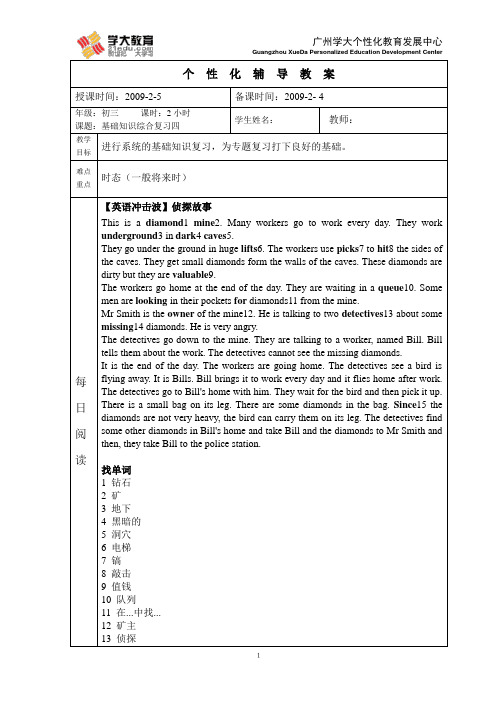
个性化辅导教案授课时间:2009-2-5 备课时间:2009-2- 4年级:初三课时:2小时课题:基础知识综合复习四学生姓名:教师:教学目标进行系统的基础知识复习,为专题复习打下良好的基础。
难点重点时态(一般将来时)每日阅读【英语冲击波】侦探故事This is a diamond1 mine2. Many workers go to work every day. They work underground3 in dark4 caves5.They go under the ground in huge lifts6. The workers use picks7 to hit8 the sides of the caves. They get small diamonds form the walls of the caves. These diamonds are dirty but they are valuable9.The workers go home at the end of the day. They are waiting in a queue10. Some men are looking in their pockets for diamonds11 from the mine.Mr Smith is the owner of the mine12. He is talking to two detectives13 about some missing14 diamonds. He is very angry.The detectives go down to the mine. They are talking to a worker, named Bill. Bill tells them about the work. The detectives cannot see the missing diamonds.It is the end of the day. The workers are going home. The detectives see a bird is flying away. It is Bills. Bill brings it to work every day and it flies home after work. The detectives go to Bill's home with him. They wait for the bird and then pick it up. There is a small bag on its leg. There are some diamonds in the bag. Since15 the diamonds are not very heavy, the bird can carry them on its leg. The detectives find some other diamonds in Bill's home and take Bill and the diamonds to Mr Smith and then, they take Bill to the police station.找单词1 钻石2 矿3 地下4 黑暗的5 洞穴6 电梯7 镐8 敲击9 值钱10 队列11 在...中找...12 矿主13 侦探14 丢失的15 由于句子必备A friend in need is a friend indeed.患难见真情。
初中英语中考语法复习重难点微专题(13)一般将来时四种语法形式全面解析
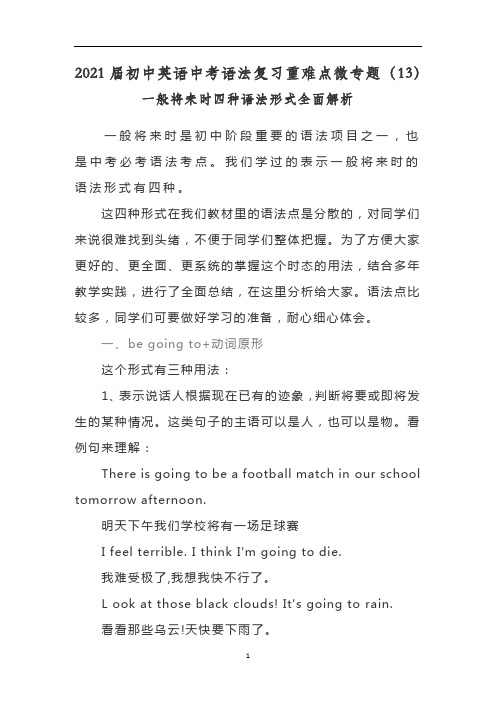
2021届初中英语中考语法复习重难点微专题(13)一般将来时四种语法形式全面解析一般将来时是初中阶段重要的语法项目之一,也是中考必考语法考点。
我们学过的表示一般将来时的语法形式有四种。
这四种形式在我们教材里的语法点是分散的,对同学们来说很难找到头绪,不便于同学们整体把握。
为了方便大家更好的、更全面、更系统的掌握这个时态的用法,结合多年教学实践,进行了全面总结,在这里分析给大家。
语法点比较多,同学们可要做好学习的准备,耐心细心体会。
一、be going to+动词原形这个形式有三种用法:1、表示说话人根据现在已有的迹象,判断将要或即将发生的某种情况。
这类句子的主语可以是人,也可以是物。
看例句来理解:There is going to be a football match in our school tomorrow afternoon.明天下午我们学校将有一场足球赛I feel terrible. I think I'm going to die.我难受极了,我想我快不行了。
L ook at those black clouds! It's going to rain.看看那些乌云!天快要下雨了。
2、表示主观现在的意图或现在已作出的决定,打算在最近或将来要做某。
这种意图或决定,往往都是事先经过考虑的。
看例子来体会:He isn't going to see his elder brother tomorrow. 他明天不准备去看他的哥哥。
Mary is going to be a teacher when she grows up. 玛丽决定长大了当一名教师。
3、只是单纯的预测未来的事,这个时候可以和will互换。
这一点对同学们来说是比较容易理解的,我们举一个简单的例子:I think it is going to/will rain this evening。
我认为今晚要下雨。
初中英语2024届中考语法复习一般现在时和一般将来时知识讲解
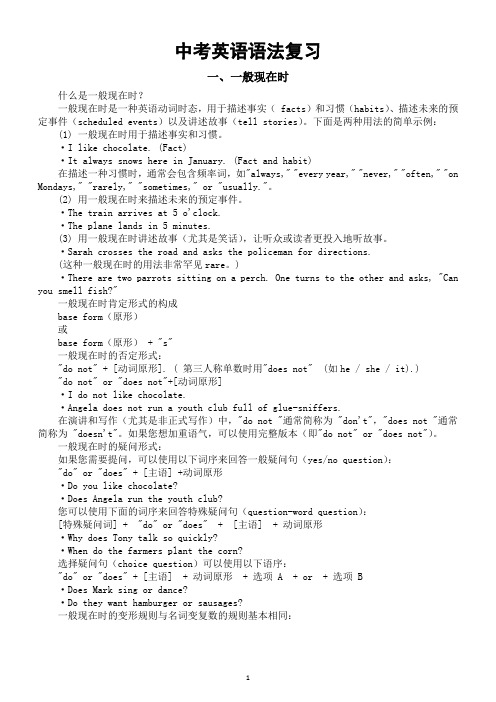
中考英语语法复习一、一般现在时什么是一般现在时?一般现在时是一种英语动词时态,用于描述事实( facts)和习惯(habits)、描述未来的预定事件(scheduled events)以及讲述故事(tell stories)。
下面是两种用法的简单示例:(1) 一般现在时用于描述事实和习惯。
·I like chocolate. (Fact)·It always snows here in January. (Fact and habit)在描述一种习惯时,通常会包含频率词,如"always," "every year," "never," "often," "on Mondays," "rarely," "sometimes," or "usually."。
(2) 用一般现在时来描述未来的预定事件。
·The train arrives at 5 o'clock.·The plane lands in 5 minutes.(3) 用一般现在时讲述故事(尤其是笑话),让听众或读者更投入地听故事。
·Sarah crosses the road and asks the policeman for directions.(这种一般现在时的用法非常罕见rare。
)·There are two parrots sitting on a perch. One turns to the other and asks, "Can you smell fish?"一般现在时肯定形式的构成base form(原形)或base form(原形) + "s"一般现在时的否定形式:"do not" + [动词原形]. ( 第三人称单数时用"does not" (如he / she / it).)"do not" or "does not"+[动词原形]·I do not like chocolate.·Angela does not run a youth club full of glue-sniffers.在演讲和写作(尤其是非正式写作)中,"do not "通常简称为 "don't","does not "通常简称为 "doesn't"。
【初中英语】初中英语语法大全之一般将来时
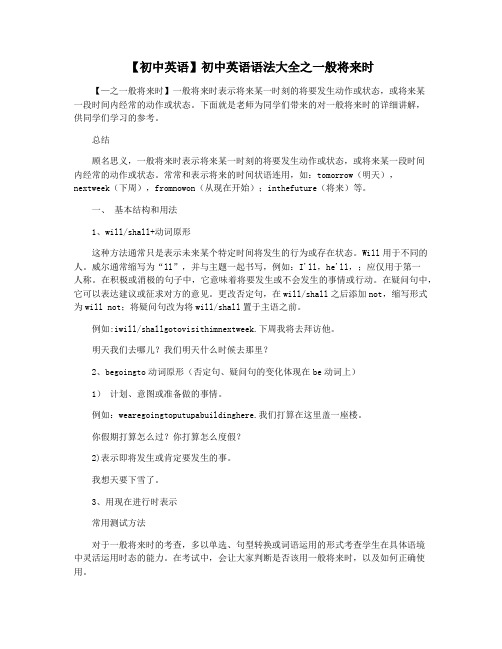
【初中英语】初中英语语法大全之一般将来时【—之一般将来时】一般将来时表示将来某一时刻的将要发生动作或状态,或将来某一段时间内经常的动作或状态。
下面就是老师为同学们带来的对一般将来时的详细讲解,供同学们学习的参考。
总结顾名思义,一般将来时表示将来某一时刻的将要发生动作或状态,或将来某一段时间内经常的动作或状态。
常常和表示将来的时间状语连用,如:tomorrow(明天),nextweek(下周),fromnowon(从现在开始);inthefuture(将来)等。
一、基本结构和用法1、will/shall+动词原形这种方法通常只是表示未来某个特定时间将发生的行为或存在状态。
Will用于不同的人。
威尔通常缩写为“ll”,并与主题一起书写,例如:I'll,he'll,;应仅用于第一人称。
在积极或消极的句子中,它意味着将要发生或不会发生的事情或行动。
在疑问句中,它可以表达建议或征求对方的意见。
更改否定句,在will/shall之后添加not,缩写形式为will not;将疑问句改为将will/shall置于主语之前。
例如:iwill/shallgotovisithimnextweek.下周我将去拜访他。
明天我们去哪儿?我们明天什么时候去那里?2、begoingto动词原形(否定句、疑问句的变化体现在be动词上)1)计划、意图或准备做的事情。
例如:wearegoingtoputupabuildinghere.我们打算在这里盖一座楼。
你假期打算怎么过?你打算怎么度假?2)表示即将发生或肯定要发生的事。
我想天要下雪了。
3、用现在进行时表示常用测试方法对于一般将来时的考查,多以单选、句型转换或词语运用的形式考查学生在具体语境中灵活运用时态的能力。
在考试中,会让大家判断是否该用一般将来时,以及如何正确使用。
典型的例子1:他在下一个星期的时候很漂亮。
a.givesb.gavec.willgivingd.isgoingtogive在她的下一个生日,我们可以看到这句话是关于未来的;动词的原形应该加在will 之后,所以C不包括在内;是一般将来时态的正确用法。
初中英语语法一般将来时

初中英语语法一般将来时一是表示将来的决定、承诺、意愿或预测;二是表示将来的惯或经常性动作;三是表示将来的突发事件。
going to则强调现在已经有了计划、安排或打算,即已经准备好要做某事了。
例如:I will call you later.(我会给你打电话。
)表示决定或承诺。
He will be a great doctor one day.(他将来会成为一名伟大的医生。
)表示预测。
I will always love you.(我将永远爱你。
)表示意愿。
We will have a meeting every Monday.(我们每周一都会开会。
)表示惯或经常性动作。
I will help you if you need it.(如果你需要,我会帮助你。
)表示突发事件。
She is going to study abroad next year.(她明年要出国留学。
)表示已经有了计划或打算。
一般现在时表示将来通常用于表示时间表或日程安排。
The train leaves at 8 am tomorrow.明天早上8点火车离开。
The conference starts on Monday.会议从星期一开始。
I have a dentist appointment next week.我下周有牙医约会。
1.The train will leave at six tomorrow morning。
indicating a future event that has already been led.2.The use of the future tense can also be seen in time or nal clauses。
as in "I'll write to you as soon as I arrive there" and "If it doesn't rain tomorrow。
初中英语语法一般将来时

一般将来时一.一般将来时的定义:表示将来某一个时间将要发生的动作或存在的状态,表示将来经常或重复发生的动作。
二.一般将来时的标志:tomorrow(明天),the day after tomorrow(后天)next year(明年)next month(T—个月)next week(下一个星期)3.一般将来时的构成:1.主语^be(am,is,are)going to+动词原形+..例如:(1).I am going to play football tomorrow.明天我将要踢足球.(2).She is going to watch a movie the day after tomorrow.后天她要看一场电影.2.主语+will/shall+动词原形+.....说明:(l).will/shall有时可以和be going to互换;(2) .will是万能的,shall只能用在第一人称,主语是I,we.(3) .will和shall的后而接动词原形)例如shall/will go to Beijing next month.。
will=I11)下个月我将要去北京.(2) .You will come to see me tomorrow.(you will=you'll)明天你将要来看我.(3) .She will read English tomorrow moming.(She will=She'll)明天早上她将要读英语.四.句一般将来时的式:1.肯定句:(1) ..主语+be(am,is,are)going to+动词原形+......(2) ..主语+will/shall+动词原形+.....例句和上面一样,就不举了.2.否定句:(1)..主语+be(am,is,are)not going to+动词原形+......例如:(A):I am not going to play basketball tomorrow.明天我不将踢足球.(B).She is not/isn't going to visit Shanghai next year.明年她不将参观上海.(2)..主语+will/shall not+动词原形+.....(A).I shall not go to school the day after tomorrow o后天我不将上学了(B).I will not write my homework this evening.(will notl=I won't)今晚我不将写作业(C).She will not see a movie next week.(will not=won't)下个星期她将不看一场电影.3.一般疑问句:(A).Am/Is,Are+主语+going to+动词原形+....例如(A).—Am I going to see my grandfather tomorrow?明天我将去看我的爷爷吗?—Yes,you are.是的,你将去.(B).— Are you going to listening to the tape tomorrow?明天你将听录音带吗?—No,I am not.不,我不将.(C). —Is she going to Beijing next year? 明年我将去北京吗?-Yes,she is.是的,她将.(2).Will//shall+主语+动词原形+…例如(A). —Shall we play volleyball next class?下一节课我们将打排球吗?-Yes,you will,是的,你们将.(B). —Will you come here next week?下个星期你将来这儿吗?-Yes,I will.是的,我将.(C).--Will she teach us this term?这学期,她将教我们吗?—Yes,she will.是的,她将.4.特殊疑问句:(1).What(Where,How...)+be(am,is,are)+主语+going to+动词原形+...?例如:(A).—What are you going to do tomorrow? 明天你将要做什么?—rm going to the park? 我将要去动物园.(B).--Where are you going to swim? 你将要去哪儿游泳?—I'm going to swim in the river.(2). What(When,Where,How...)+主语+动词原形+...?例如:(A).---What will you do next week?下个星期你将要做什么?--1 will do my homeworko 我将要做作业.(B).—How will she come here tomorrow?明天她将要怎么来这儿?—She will come here by bus 。
中考英语动词时态精练解析版--一般将来时
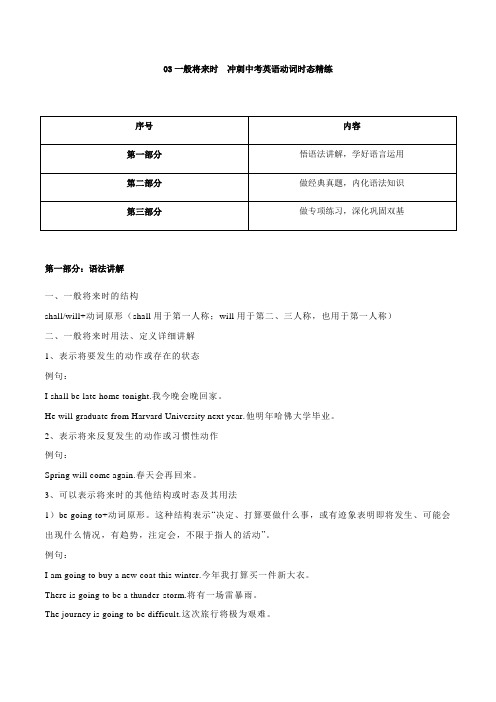
03一般将来时冲刺中考英语动词时态精练第一部分:语法讲解一、一般将来时的结构shall/will+动词原形(shall用于第一人称;will用于第二、三人称,也用于第一人称)二、一般将来时用法、定义详细讲解1、表示将要发生的动作或存在的状态例句:I shall be late home tonight.我今晚会晚回家。
He will graduate from Harvard University next year.他明年哈佛大学毕业。
2、表示将来反复发生的动作或习惯性动作例句:Spring will come again.春天会再回来。
3、可以表示将来时的其他结构或时态及其用法1)be going to+动词原形。
这种结构表示“决定、打算要做什么事,或有迹象表明即将发生、可能会出现什么情况,有趋势,注定会,不限于指人的活动”。
例句:I am going to buy a new coat this winter.今年我打算买一件新大衣。
There is going to be a thunder-storm.将有一场雷暴雨。
The journey is going to be difficult.这次旅行将极为艰难。
2)be going to和will等的比较。
①will表示说话人认为、相信、希望或假定要发生的事,不含任何具体时间,可以指遥远的将来。
而be going to指有迹象表明某事即将发生或肯定会发生,通常表示很快就要发生的事情。
例句:There is going to be a quarrel between them, I think.看来两人要发生争吵了。
He is going to get better.他的病就要好了。
②be going to和will均可表示“意图”;但事先考虑过的意图用be going to,而不是事先考虑的意图用will。
例句:A: Why have you torn the paper into pieces?B: I am going to rewrite it. (事先考虑的)A: It is a really big stone.B: I will help you to move it. (未经考虑的)3)现在进行时。
初中英语一般将来时语法精讲

初中英语一般将来时语法精讲初中英语一般将来时语法精讲初中英语一般将来时语法大全精讲【—一般将来时精讲】对于英语一般将来时语法知识的讲解内容,希望同学们能很好的掌握。
一般将来时表示将来某一时刻或经常发生的动作或状态。
①一般将来时的时间状语有:tomorrow,this (afternoon),next (year),one day,now,soon,someday,sometime, in the future, when引导的从句等。
② 用will构成的将来时,表示动作与人的主观愿望无关。
“shall”用于第一人称,“will”用于所有人称。
如:I will graduate from this school soon.(我很快就要从这所中学毕业了)/ You will stay alone after I leave.(我走了之后你就要一个人过了)③ “am/is/are going to+动词原形”表示打算或准备要做的事情,或者主观判断即将要发生的事情,而“am/is/are to +动词原形”表示安排或计划中的动作。
如:A man told them that the woman was to give birth to the special baby.(有一个人告诉他们那个妇女就会生下那个特别的男孩)/ It’s going to rain soon.(天快要下雨了)④ 表示一个人临时决定要做某事,可以用will表达。
如:I will go to the lab to get somechemicals(化学药剂). So please wait until I return.(我要到室去取些药品,请等我回头)⑤ 现在进行时、一般现在时也可以表示将来。
(见相应时态)⑥ shall和will 在口语的一些疑问句中相当于情态动词。
Shall一般与第一人称连用,will与第二人称连用。
如:Shall we go to the zoo next Saturday?(我们下周六去动物园好吗?)/ Will you please open the door for me?(替我把门打开好吗?)⑦ “be to +动词原形”表示按照计划将要发生的事情。
一般将来时的知识点归纳

一般将来时的知识点归纳关于一般将来时的知识点,在英语的语法中,一般将来时可以表达或者推测将来发生的动作或状态,主要包括:将来现在完成时(Future Perfect)以及将来简单时(Future Simple),对应着中文中的“将来完成时”、“一般将来时”等概念。
将来完成时由这几种变异组成:将来完成完成式(Future Perfect Continuous)、将来完成式(Future Perfect)、将来完成进行式(Future Perfect Continuous)。
它们的复合形式表达将来某个时间段内完成的动作,几种变异及其语法如下:(1)将来完成式(Future Perfect)语法结构为:will/shall have + 过去分词其用法有:主句用will/shall have,它可以表达将来某一特定时间前发生的动作或状态,而且仍将持续到将来某一时间。
例如:By next week, I will have tidied the room. 到下周时,我将把房间打扫干净。
(2)将来完成进行式(Future Perfect Continuous)语法结构为:will/shall have+ been + 动词-ing 形式其用法有:表示将来某一时间前持续进行的动作。
例如:By the end of this month, I will have been living here for five years. 到本月底,我将已在这里住了5年。
(3)将来简单式(Future Simple)语法结构为:will/shall + 动词原形其用法有:指示将来将发生的事情,即将要发生的动作或意向。
例如:I will call him tomorrow. 我明天会打电话给他。
总之,一般将来时是英语中非常常用的语法时态结构,它可以用来表示将来发生的动作或者将要发生的意向,在英语语法学习中占据了不可忽略的地位。
2024年中考英语语法复习—一般将来时课件

2)用在由when,if等引导的时间状语从句和 条件状语从句中,表示将来的动作。
If it doesn’t rain tomorrow,we will go hiking. 如果明天不下雨,我们将去远足。
★一般将来时经常会伴随一些时间状语,比较常见的有:
tomorrow
soon
next week下周
练习
1 . There ________ a sports meet next week if it
________.
A.is going to have; doesn’t rain
B.is going to be; doesn’t rain
C.is going to be; won’t rain D.is going to have; won’t rain
Will you go there? 你要去那儿吗?
“Shall I...?”“Shall we...?”常用来征求对方意见。“Will you...?”表示客气的邀请或请求。
Will you please open the window? 请你把窗打开,好吗?
3.否定句:在will/shall后加not,可缩写成 won’t/shan’t 陈述句:I will go there./I shall go there. 我要去那儿。
to +
+其他
not,即主语+be not going
I am not going to watch the video. 我不准备去看录像。
3)一般疑问句:将be
Is he going to see a doctor? 他准备去看医生吗?
4)含有be goi to+动词原形+其他
英语语法大攻克--一般现在时将来时态讲解
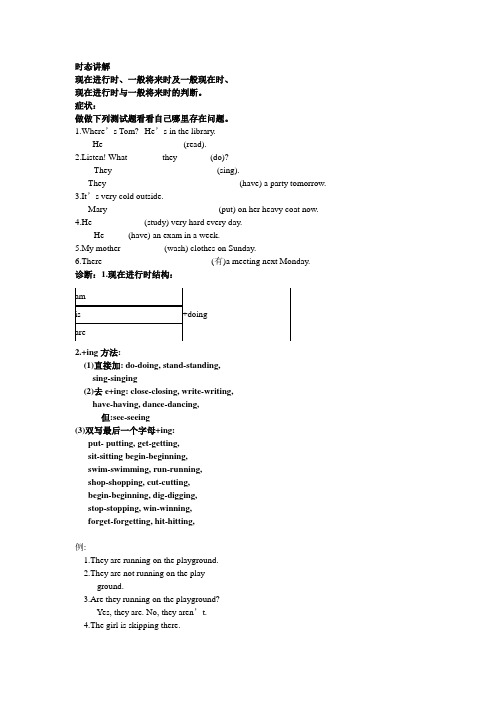
时态讲解现在进行时、一般将来时及一般现在时、现在进行时与一般将来时的判断。
症状:做做下列测试题看看自己哪里存在问题。
1.Where’s Tom?--He’s in the library.He _______________ (read).2.Listen! What ____ they _____ (do)?--They ____________________(sing).They __________________________ (have) a party tomorrow.3.It’s very cold outside.Mary _____________________ (put) on her heavy coat now.4.He _____ (study) very hard every day.--He _____(have) an exam in a week.5.My mother ______ (wash) clothes on Sunday.6.There_________________________(有)a meeting next Monday.诊断:1.现在进行时结构:2.+ing方法:(1)直接加: do-doing, stand-standing,sing-singing(2)去e+ing: close-closing, write-writing,have-having, dance-dancing,但:see-seeing(3)双写最后一个字母+ing:put- putting, get-getting,sit-sitting begin-beginning,swim-swimming, run-running,shop-shopping, cut-cutting,begin-beginning, dig-digging,stop-stopping, win-winning,forget-forgetting, hit-hitting,例:1.They are running on the playground.2.They are not running on the play-ground.3.Are they running on the playground?Yes, they are. No, they aren’t.4.The girl is skipping there.5. John is swimming in the river.6. Jennet is cutting the birthday cakenow.3.一般将来时:(2)任何人称+ will + do例:She will come tomorrow.She won’t (will not) come tomorrow.Will she come tomorrow? Yes, she will.No, she won’t.(3)第一人称(I, we)+ shall +do例:We shall go boating next Friday.4.易错点:(1)填写现在进行时的时候容易忘掉be,只顾+ ing.例:wait Hurry! They ______for me. (2)There be句型的将来时,这个句型中无have/has例:There______ a sports meeting soon.A. will haveB.isC.are going to beD.will be(3)简单答语中的缩写问题--肯定回答不缩写例:Yes, I am. Y es, they will.--否定回答缩写例:No, he isn’t. No, I won’t.(4)in a year,in two weeks,in six months是指未到来的时间,需要一般将来时。
英语语法大攻克--动词时态
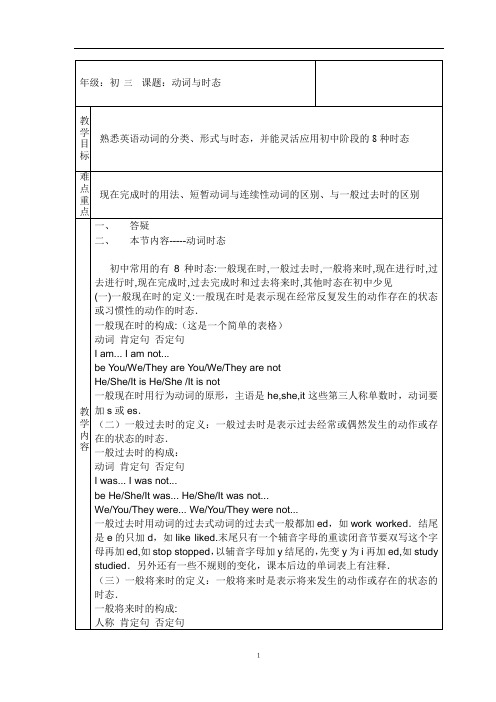
年级:初三课题:动词与时态教学目标熟悉英语动词的分类、形式与时态,并能灵活应用初中阶段的8种时态难点重点现在完成时的用法、短暂动词与连续性动词的区别、与一般过去时的区别教学内容一、答疑二、本节内容-----动词时态初中常用的有8种时态:一般现在时,一般过去时,一般将来时,现在进行时,过去进行时,现在完成时,过去完成时和过去将来时,其他时态在初中少见(一)一般现在时的定义:一般现在时是表示现在经常反复发生的动作存在的状态或习惯性的动作的时态.一般现在时的构成:(这是一个简单的表格)动词肯定句否定句I am... I am not...be You/We/They are You/We/They are notHe/She/It is He/She /It is not一般现在时用行为动词的原形,主语是he,she,it这些第三人称单数时,动词要加s或es.(二)一般过去时的定义:一般过去时是表示过去经常或偶然发生的动作或存在的状态的时态.一般过去时的构成:动词肯定句否定句I was... I was not...be He/She/It was... He/She/It was not...We/You/They were... We/You/They were not...一般过去时用动词的过去式动词的过去式一般都加ed,如work worked.结尾是e的只加d,如like liked.末尾只有一个辅音字母的重读闭音节要双写这个字母再加ed,如stop stopped,以辅音字母加y结尾的,先变y为i再加ed,如study studied.另外还有一些不规则的变化,课本后边的单词表上有注释.(三)一般将来时的定义:一般将来时是表示将来发生的动作或存在的状态的时态.一般将来时的构成:人称肯定句否定句一I/We will go. I/We will not go.二You will go. You will not go.三He/She/It/They will go.He/She/They will not go一般将来时由助动词(will,shall)+动词原形构成,shall主要用于以第一人称(I,We)为主语的疑问句中.(四)现在进行时的定义:现在进行时是表示在某一时刻或某段时间正在进行的动作的时态.现在进行时的构成:现在进行时由系动词(am,is,are)+现在分词(动词加ing形式)构成.如I am working.Am I working?I am not working.(五)过去进行时的定义:过去进行时是表示在过去某一时刻或某段时间内正在进行的动作时态.过去进行时的构成:过去进行时是由系动词的过去式(was were)+现在分词(动词加ing)构成的.如I was talking,Was I talking?I was not talking.(六)现在完成时的定义:现在完成时是表示在过去发生但与现在情况有联系的动作或状态的时态.现在完成时的构成:现在完成时是由助动词have,has+过去分词构成的,过去分词的变化方法和上述的过去式的方法一样,在此不做详细解释.过去分词也有不规则的.如You have talked.Have you talked?(七)过去完成时的定义:过去完成时表示在过去某一时间或动作以前已完成的行为或存在的状态.过去完成时的构成:过去完成时由助动词had(无人称和数的变化)+过去分词构成,其否定句式和疑问句式在结构上与现在完成时一样.如They /he had read it.Had they/he read it?(八)过去将来时的定义:过去将来时表示从过去的观点看将来发生的动作或存在的状态.过去将来是的构成:过去将来时由助动词would+动词原形构成.如He said he would come..I will tell him as soon as he _____ backA. comeB. comesC. will comeD. came2. Mary _____ on shoes when she ____ them.A. tries…buysB. tries… buiesC. trys… buysD. trys… buies3. The girl often ______ cold when she ______.A. cathcs…dancesB. catches… dancesC. catchs…danceesD.catches… dancee4. _____ he ____ himself there? No, I don't think so.A. Do…enjoyB. Does… enjoiesC. Does… enjoysD. Does…enjoy5. _____ your teacher ____ from them very often? Certainly.A. Do…hearB. Does…hearC. Do… receiveD. receive6. _____ your mother _____ some cleaning on Sundays?A. Does…doesB. Do…doesC. Does…doD. Do… do7. _____ Tom _____to work hard to help his family ? Yes, he _____.A. Has… x…doesB. Has…x…doesC. Does…has…hasD. Does… have…does8. Which teacher _____ lessons to you every day ?A. does …givesB. does… giveC. do… giveD. g ives9. Smith does not go fishing on weekdays, ____? _____ , he does.A. does he…NoB. does he…YesC. doesn't he…NoD. doesn't he…Yes10.Mr Black often _____ fishing on Sundays, _____ he ?A. goes…doesn'tB. goes…isn'tC. doesn't go…doesD. doesn't go…is11.He usually _____ TV on Sunday evening.A. watchB. watchesC. watchingD. is watching12. We'll go to play with snow if it ______ tomorrow.A. snowB. snowsC. will snowD. snowed13. Neither I nor he ______ French.A. speakB. doesn't speakC. speaksD. doesn't speak14. Nobody ______ how to run this machines.A . know B. have known C. knows D. is knowing15. The Young Pioneer _____ water for the old man every day.A. carryB. bringC. takesD. carries16. Some are ______ in the river and some are ______ games.A. swimming… playingB. swimming…plaiingC. swimming… I playingD. swimming…plaing17. Look ! The boy students are _____ football while the girls are _____ .A. playing… danceB. playing… dancingC. play… dancingD. play… dance18. He _____ to do his lessons at eight every evening.A. is beginningB. is beginningC. beginD. begins19. _____ he _____ on well with his friends this term ?A. Does…getsB. Does…getC. Is…gettingD. Is…geting20. Mr Smith _____ short stories, but he ____ a TV play these days.A. is writing…is writingB. is writing… writesC. writes… is writingD. writes… writes21. I _____ to the cinema. I ______ there every Sunday.A. go…goB. am going… goC. go… am goingD. am going…am going22. Look, they______ a good time, ____ they ?A. have…doB. have…don'tC. are having…areD. are having… aren't23. You ______ about the future now, ______ you ?A. don't think…don'tB. aren't thinking… aren'tC. don't think… doD. aren't thinking… are24. She always ______ something whenever she ______.A .studied…played B. studied…plaiedC.. studied…plaiedD. studied… played25. He often _____ late in the forest. It _____ me very much.,A. stayed…worriedB. staied… worriedC. stayed…worryedD. staied… worried26. I ______that the boy _____ with no tears in his eyes.A. noticed… cryedB. noticed… criedC. noticed…criedD. noticed… cryed27. We _____the floor and _____ all the windows.A. mopped… cleannedB. moped… cleanedC. mopped…cleanedD. moped… cleaned28. When I _____ the Children's Palace, the children _____ with joy.A. visited… jumppedB. visited… jumpedC. visited… jumpedD. visited… jumpped29. ______ a sports meet last Sunday ? Yes , they ______.A. Did they have… didB. Did they have… hadC. Had they... had D. Had they (i)30. ____ you _____out for a walk after supper ? Yes, I ______.A. Did…went…wentB. Did… go… wentC. Did... went... did D. Did... go (i)31. _____ Jack _____ on with his work or ______ to have a rest?A. Did… went… stoppedB. Did… go… stopC. Did… went… stopD. Did… go… stopped32. You gave them a talk two days ago, _____you ? Yes, I ______.A. did… didB. did… gaveC. didn't… didD. didn't… gave33. ____ your brother _____ a letter to ? My father.A. Who… wroteB. What…wroteC. Who did…writeD. What did… write34. They _____ about the TV news then in the sitting-room. They often ____ such talksA. talked…hadB. talk…haveC. were talking…hadD. are talking…have35. He ______ some cooking at that time, so _____ me.A. did… heardB. did… didn't hearC. was doing… heardD. was doing… didn't hear36. " _____ you angry then?" "They_ too much noise.”A. Are…were makingB. Were…were makingC. Are…madeD. Were… made37. This time yesterday Jack _____ his, bike. He _____ TV.A. repaired… didn't watchB. was repairing… watch edC. repaired… watchedD. was repairing… wasn't watching38. We _____ for Tom at ten last Sunday. He often kept us ______.A. were waiting… waitingB. were waiting… waitC. waited… waitingD. waited… wait39. When you _____ at the door, I _____ some washing.A. knocked... did B. was knocking (i)C. knocked… was doingD. knock… am doing40. The boy_____ English on the radio when I _____ his door.A. learned… was openingB. was learning… openedC. learned… openedD. is learning… open41. When they______ through the forest, a bear _____ at them.A. walked… was comingB. were walking… cameC. were talking… comesD. walk… is coming42. A young man _____ her while she _____ her work .A. watched… was finishingB. was watching… finishedC. watched… finishedD. was watching… was finishing43. While mother _____ some washing, I ______ a kite for Kack.A. did… madeB. was doing… madeC. was doing… was makingD. did… was making44. I _____ myself French from 7 to 9 yesterday morning. I _____ to work.A. was teach ing… didn't goB. taught… didn't goC. was teaching… wentD. taught… went45. He _____ a model plane when I came to see him.A. makesB. is makingC. was makingD. made46. I ______ a letter at nine last night.A. is writingB. was writingC. wroteD. is writing47. The teacher_____ (give) us a history lesson when Tom walked into the classroom.A. gaveB. is givingC. was givenD. was giving48. There will be a football match in two days, that is _______.A. last SundayB. next SundayC. every SundayD. this Sunday49. We ______ class meeting this November.A. hadB. haveC. will haveD. are having50. He ______ in his garden every morning next year.A. will workB. worksC. workedD. is working52. Look at those clouds. It _____ soon, I'm afraid.A. is going to rainB. is rainingC. will rainD. won't rain54. _____ he _____ some shopping tomorrow afternoon ?A. Will…doesB. is going to doC. is…doingD. Shall… do57. _____ you ____ me up at six, please ?A. Are…going to wakeB. Are…wakingC. Will…wakeD. Do…wake58. If he ______ to college, he _____ a lot more.A. will go…will learnB. will go…is going to learnC. is going… is going to learnD. goes… will learn59. When she _____ next time ,l ______ her everything.A. is going to come…shall tellB. will come…shall tellC. comes…will tellD. come…will tell61. She _____that she _____ her best to help them the next term.A. says…will doB. said…will doC. said… would doD. says…would do62. People _____ that the Smiths _____ for a holiday next week.A. say… will goB. said… will goC. said… would goD. say…would go63. Nobody _____ us that he _____ even stricter with usA. tell…will beB. tells…would beC. told…will beD. told…would be64. Please _____ him that we _____ able to help him.A. tell…will beB. tells… would beC. told…will beD. told… would be66. I _____to know if Mary_____ by train that afternoon.A. want… would goB. want… will goC. wanted… would goD. wanted… will go67. _____ he _____ that they _____ home tomorrow?A. Does… learn… would goB. Does… learn… will goC. Did… learn… would goD. Did… learn… will go70. I _____ that you _____ good care of her that day.A. thought…will takeB. thought…would takeC. think… will take B. think… would take75. Mother ____ me a new coat yesterday, I _____ it on. It fits me well.A. has made…have triedB. made…have triedC. has made…triedD. made…tried76. " He ____ to draw horses already ."" When ____he ?”. " Last year. "A. learned...has B. learned...did C. has learned...has D. has learned (i)77. Tom ____ up into the tree. Look, he _____ high up there !A. has got… isB. has climbed… wasC. got… wasD. climbed… is78. _____you _____ the text yet ? Yes, we _____ it two hours ago.A. Did…copy…didB. Have… copied…haveC. Have… copied… didD. Did …copy…ha d79. "Why she angry?" "Because he _____ at he just now.A. did… get, shoutedB. has…got…shoutedC. did… get… has shoutedD. has…got…has shouted80. _____ you ______ the film before ? Where ____ you _____ it ?A. Have… seen… did… seeB. Did…see…die…watchC. Have…seen… have… seenD. Did…see…have…seen81. You _____ me waiting for two hours. I _____ for you since five.A. Kept…waitedB. have kept…waitedC. kept…have waitedD. have kept…have waited82. Where _____John _____? To the library. He _____ there for an hour.A. has… been … has goneB. has…gone…has beenC. did… go… wentD. did…be…went83. _____ the baby still _____ ? No, it ______ crying.A. Has… cried… has stoppedB. Is…crying…stoppedC. Did… cry… stoppedD. Is…crying…has stopped84. I _____ the way. I ______ here for quite many years.A. knew... have lived B. knew (iv)C. know... have lived D. know (iv)85. _____ you ever _____America ? Yes, I have.A. Have… gone toB. Have… gone inC. Have… been toD. Have… been in86. My brother _______ college for over three years.A. has gone toB. has been toC. has been inD. has been for87. He _____ the Army by the end of 1992. He ____ in the army since then.A. joined…isB. has joined…has beenC. had joined…isD. has joined… has been88. By the time I _____ back they ____ up ten metres.A. came…have climbedB. came…had climbedC. come…have climbedD. had come…climbed89. Jack ____ over five lessons by seven o'clock. Then he____ a test.A. went…tookB. went…had takenC. had gone…tookD. had gone…had taken90. We _____ out by that time that he ____ a thief for a long time.A. had found…had beenB. had found…wasC. found…had beenD. found…was91. Before the new _____ him, he ____ to know about it.A. reaches… has gotB. reached…had gotC. reached… gotD. had reached…got92. I _____ him a second letter before I _____ from him.A. wrote… heardB. wrote… had heardC. had written… heardD. have written… hear93. We _____ in a good harvest because we ______ enough rain.A. didn't get… had hadB. got… had hadC. had got… ha d badD. got… hadn't had94. They ____for five hours when they ____ in New York.A. flew…arrivedB. had flown…had arrivedC. flew…had arrivedD. had flown…arrived95. She ____ that ____ it for two days by that day.A. says…has rainedB. says…had rainedC. said… had rainedD.said…rained96. John _____ there since the year before, so he ____ them.A. had worked…knewB. had worked….had knownC. worked…knewD. worked…had known'97. He _____ angry because he _____ for a long time.A. had got…had waitedB. got…waitedC. had got…waitedD.got…had waited98. Paper _____ first invented in China.A. isB. areC. wasD. were99. The Greens _____ China for five years.A. has been inB. have been inC. went toD. has gone to100.There _____ an eraser under the desk. Is it yours ?A. isB. hasC. wasD. had-复习学习管理师家长或学生阅读签字教师课后赏识评价老师最欣赏的地方:老师的建议:老师想知道的事情。
英语语法大攻克--一般将来时(整理)
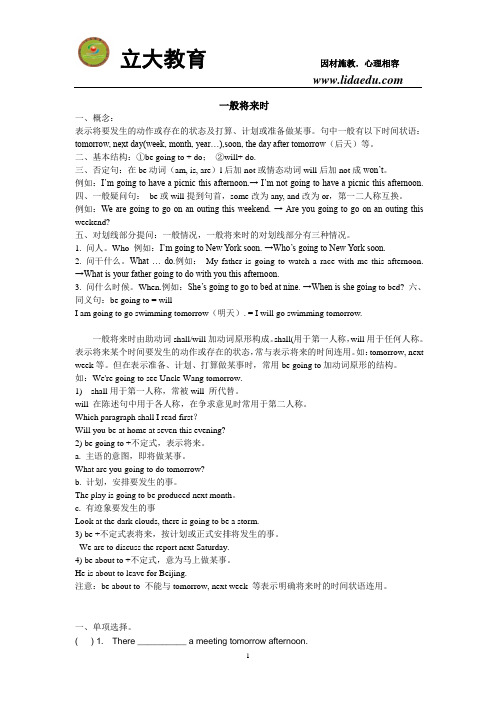
一般将来时一、概念:表示将要发生的动作或存在的状态及打算、计划或准备做某事。
句中一般有以下时间状语:tomorrow, next day(week, month, year…),soon, the day after tomorrow(后天)等。
二、基本结构:①be going to + do;②will+ do.三、否定句:在be动词(am, is, are)l后加not或情态动词will后加not成won’t。
例如:I’m going to have a picnic this afternoon.→ I’m not going to have a picnic this afternoon.四、一般疑问句:be或will提到句首,some改为any, and改为or,第一二人称互换。
例如:We are going to go on an outing this weekend. → Are you going to go on an outing this weekend?五、对划线部分提问:一般情况,一般将来时的对划线部分有三种情况。
1. 问人。
Who 例如:I’m going to New York soon. →Who’s going to New York soon.2. 问干什么。
What … do.例如:My father is going to watch a race with me this afternoon. →What is your father going to do with you this afternoon.3. 问什么时候。
When.例如:She’s going to go to bed at nine. →When is she goi ng to bed? 六、同义句:be going to = willI am going to go swimming tomorrow(明天). = I will go swimming tomorrow.一般将来时由助动词shall/will加动词原形构成。
中考人教版初中复习语法---一般将来时和过去将来时教学案及练习

中考人教版初中复习语法---一般将来时和过去将来时教学案及练习同学英语学科核心素养培养与个性发展研究巩固练习一.选择填空1. Li Ming said he _____happy if Brian_____to China next month.A. as; comeB. was; would comeC. would be; cameD. will be; come2. Jenny said she _____her holiday in China.A. spentB. would spentC. was going to spentD. would spend3. —What did your son say in the letter?—He told me that he ______ the Disney World the next day.A. will visitB. has visitedC. is going to visitD. would visit4. Father said that he ______ me to Beijing the next year.A. tookB. would takeC. takesD. will take5. We were not sure whether they ______ more vegetables.A. are going to growB. were going to growC. will growD. have grown6. She ______ to work when the telephone rang.A. is goingB. will goC. was about to goD. is to go7. – Where is the morning paper? – I ________ if for you at once.A. getB. am gettingC. to getD. will get8. ________ a concert next Saturday?A. There will beB. Will there beC. There can beD. There are9. If they come, we ________ a meeting.A. haveB. will haveC. hadD. would have10. He ________ her a beautiful hat on her next birthday.A. givesB. gaveC. will givingD. is going to give11. He ________ to us as soon as he gets there.A. writesB. has writtenC. will writeD. wrote12. He ________ in three days.A. coming backB. came backC. will come backD. is going to coming back13. If it ________ tomorrow, we’ll go roller-skating.A. isn’t rainB. won’t rainC. doesn’t rainD. doesn’t fine14. – Will his parents go to see the Terra Cotta Warriors tomorrow? – No, ____(不去).A. they willn’t.B. they won’t.C. they aren’t.D. they don’t.15. We ________ the work this way next time.A. doB. will doC. going to doD. will doing16. Tomorrow he ________ a kite in the open air first, and then ________ boating in the park.A. will fly; will goB. will fly; goesC. is going to fly; will goesD. flies; will go17. The day after tomorrow they ________ a volleyball match.A. will watchingB. watchesC. is watchingD. is going to watch18. There ________ a birthday party this Sunday.A. shall beB. will beC. shall going to beD. will going to be19. They ________ an English evening next Sunday.A. are havingB. are going to haveC. will havingD. is going to have20. ________ you ________ free next Sunday?A. Will; areB. Will; beC. Do; beD. Are; be二. 用所给动词的适当形式填空1. Miss Zhang said she ________(visit) the Great Wall next summer.2. She told him that she ________(not stay) here for long.3. I wasn’t sure whether Lucy_______(come) the next year.4. The scientists said the world’s population _______ (slow) down in future.5. She said the bus _______(leave) at five the next morning.6. I wasn't sure whether he _______(lend) me his book the next morning.7. He was fifty-six. In two years he _______(be) fifty-eight.8. Whenever she has time, she ______(help) them in their work.一、英语阅读理解专项练习试卷1.阅读理解China's second female astronaut, Wang Yaping, has given the country's first-ever video lecture from space. The whole lecture lasted about 40 minutes.Speaking to students through live video, from the Tiangong-I space laboratory, Ms. Wang used spinning tops (旋转的陀螺), a ball and some water to explain physics in zero-gravity(失重), with the help of a fellow astronaut.Ms. Wang used different experiments to demonstrate the concepts of weight and mass(重量和质量的概念) in space. Towards the end of the class, Ms. Wang made a film(薄膜) of water using a metal ring. She then turned the film of water into a water ball by pouring more water onto it.Around 330 primary and secondary school students watched the lecture from a special classroom in Beijing, where they could also ask Ms. Wang questions through live video. From time to time, the students greeted her lecture with warm applause(掌声).When answering a student's question, Ms. Wang described what she could see in space. "The stars we see are much brighter, but they do not twinkle(闪烁)," she said, "The sky we see isn't blue, but black. And every day, we can see the sun rise 16 times because we circle the Earth every 90 minutes."About 60 million students and teachers around China also watched the lecture live on TV.(1)What's the purpose(目的) of the space lecture?A. To explain physics of zero-gravity in space.B. To demonstrate the concept of weight and mass in space.C. To tell us what can be seen in space.D. To show that the Earth is far away from space.(2)What does the underlined word "demonstrate" in the passage most probably mean in Chinese?A. 区别B. 强调C. 传授D. 演示(3)Towards the end of the lecture, Wang Yaping made a film of water so as to .A. play with itB. use a metal ringC. turn it into a water ballD. pour more water onto it(4)About students and teachers watched the lecture both from a special classroom and on TV.A. 330B. 60,000,000C. 6,000,330D. 60,000,330(5)Which is NOT true according to the passage?A. Wang Yaping is China's second female astronaut.B. Wang Yaping gave the lecture from space all by herself.C. The lecture was warmly welcomed by the students.D. The sky isn't blue but black when astronauts see it in space.【答案】(1)A(2)D(3)C(4)D(5)B【解析】【分析】文章大意:中国的第二位女宇航员王亚平已经在空间上发表了全国第一个视频讲座。
中考英语考点之一般将来时

中考英语考点之一般将来时命题趋势:动词的时态是中考出现频率较高的语法项目之一。
考题多以具体的语境为主,体现了对语法知识、语境理解、语言交际能力的综合考查。
中考考查重点:1. 了解并能运用常考的六种时态,尤其熟练运用一般现在时、一般过去时、进行时等高频时态;2. 正确辨析几种易混时态的区别。
一般将来时主要构成形式一般将来时表示将来某个时间要发生的动作,事情或存在的状态,也表示将来经常或反复发生的动作或事情。
1. will/shall+动词原形,shall用于第一人称,常被will 所代替。
will在陈述句中用于各人称,在征求意见时常用于第二人称,will not=won’t,shall not=shan’t。
Which paragraph shall I read first? 我先读哪一段呢?Will you be at home at seven this evening? 今晚七点回家好吗?2. be going to +不定式,表示将来。
a. 主语的意图,即将做某事。
What are you going to do tomorrow? 明天打算作什么呢?b. 计划、安排要发生的事。
The play is going to be produced next month。
这出戏下月开播。
c. 有迹象要发生的事。
Look at the dark clouds, there is going to be a storm. 看那乌云,暴风雨快来了。
3. be +不定式表将来,按计划或正式安排将发生的事。
We are to discuss the report next Saturday. 我们下星期六讨论这份报告。
4. be about to +不定式,意为"马上做某事"。
He is about to leave for Beijing. 他马上要去北京。
学&科网注意:be about to do不能与tomorrow, next week等表示明确将来时的时间状语连用。
英语语法大攻克--四类基本时态练习
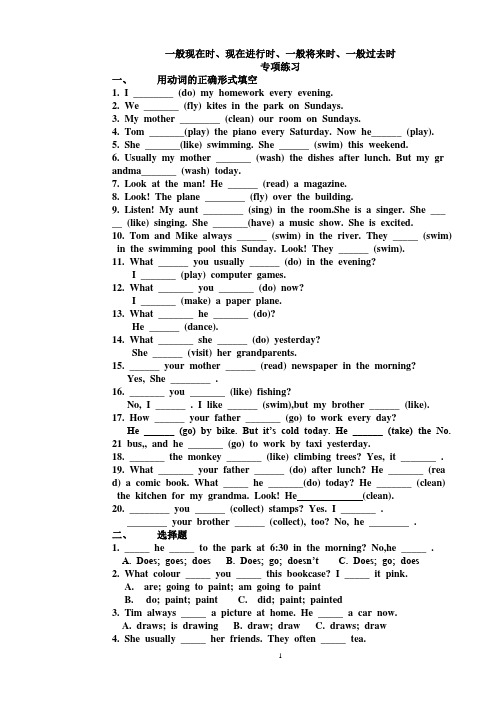
一般现在时、现在进行时、一般将来时、一般过去时专项练习一、用动词的正确形式填空1. I ________ (do) my homework every evening.2. We _______ (fly) kites in the park on Sundays.3. My mother ________ (clean) our room on Sundays.4. Tom _______(play) the piano every Saturday. Now he______ (play).5. She _______(like) swimming. She ______ (swim) this weekend.6. Usually my mother _______ (wash) the dishes after lunch. But my gr andma_______ (wash) today.7. Look at the man! He ______ (read) a magazine.8. Look! The plane ________ (fly) over the building.9. Listen! My aunt ________ (sing) in the room.She is a singer. She ___ __ (like) singing. She _______(have) a music show. She is excited.10. Tom and Mike always ______ (swim) in the river. They _____ (swim) in the swimming pool this Sunday. Look! They ______ (swim).11. What ______ you usually ______ (do) in the evening?I _______ (play) computer games.12. What _______ you _______ (do) now?I _______ (make) a paper plane.13. What _______ he _______ (do)?He ______ (dance).14. What _______ she ______ (do) yesterday?She ______ (visit) her grandparents.15. ______ your mother ______ (read) newspaper in the morning?Yes, She ________ .16. _______ you _______ (like) fishing?No, I ______ . I like ______ (swim),but my brother ______ (like). 17. How ______ your father _______ (go) to work every day?He ______ (go) by bike. But it’s cold today. He ______ (take) the No.21 bus,, and he _______ (go) to work by taxi yesterday.18. _______ the monkey _______ (like) climbing trees? Yes, it _______ .19. What _______ your father ______ (do) after lunch? He _______ (read) a comic book. What _____ he _______(do) today? He _______ (clean) the kitchen for my grandma. Look! He (clean).20. ________ you ______ (collect) stamps? Yes. I _______ .________ your brother ______ (collect), too? No, he ________ .二、选择题1. _____ he _____ to the park at 6:30 in the morning? No,he _____ .A. Does; goes; doesB. Does; go; doesn’tC. Does; go; does2. What colour _____ you _____ this bookcase? I _____ it pink.A. are; going to paint; am going to paintB. do; paint; paintC. did; paint; painted3. Tim always _____ a picture at home. He _____ a car now.A. draws; is drawingB. draw; drawC. draws; draw4. She usually _____ her friends. They often _____ tea.A. see; drinkB. sees; drinksC. sees; drink5. He usually _____ the dishes at night, but tonight he _____ clothes.A. wash; washB.washes; is going to washC. is washing; washes6. Mr. Green usually _____ his newspaper in the evening, but he and hi s wife _____ television yesterday evening.A.reads; watchesB.reads; is going to watchC.reads; watched7. Where are the man and the woman? They _____ near the tree.A. sitB. satC. are sitting8. _____ your penpal _____ diving? No, he _____ .He ______ writing sto ries.A. Does; like; doesn’t; likesB. Does; likes; doesn’t; likeC. Do; like; don’t; likes9. _____ you _____ fishing yesterday? No, we _____ .A. Doe s; go; doesn’tB. Did; go; didn’tC. Do; go; don’t10. Open the window, Please. Look! He _____ it.A. opensB. is openningC. is opening11. I usually _____ some milk every day. But I _____ coffee yesterday.A. drink; drankB. is drinking; drinkC. drank; am drinking12. Mr. Green often _____ his newspapers at night. But he _____ an interesting book tonight.A. reads; readsB. reads; readC. reads; is going to read13. The old man _____ playing sports in the park. He _____ morning exercise now.A. likes; is doingB. likes; doesC. like; doing14. What ____you usually _____in the evening? I _____computer games.What _____ you _____ last night? I _____ a book.A. do; do; playB. did; do; playedC. does; do; playsdid; do; read do; do; read do; do; am reading15. Where ______ the boy _____ ? He _____ across the river now.A. does; swim; swimsB. is; swimming; is swimmingC. is; swimming; is swimming16. _____ you _____ to music now? Yes, we _____ .A. Do; listen; doB. Did; listen; didC. Are; listening; are17. Put on you coat, please. OK. I ______ it on.A. am puttingB. am going to putC. put18. _____ you ______ coffee? Yes, I ______ .A. Do; like; doB. Did; like; didC. Are; like; am19. Look! Two cats ______ across the wall.A. runB. runsC. are running20. She _____ tea, but he _____ .A. likes; doesn’t B; like; don’t C. like; doesn’t。
英语语法一般将来时的讲解
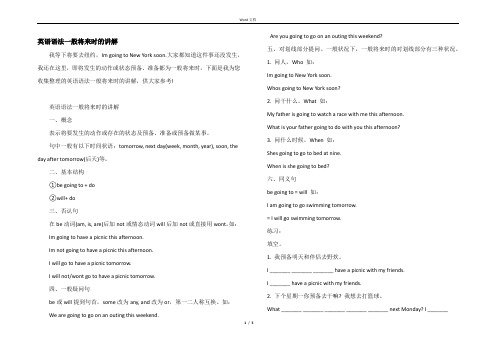
英语语法一般将来时的讲解我等下将要去纽约,Im going to New York soon.大家都知道这件事还没发生,我还在这里,即将发生的动作或状态预备、准备都为一般将来时,下面是我为您收集整理的英语语法一般将来时的讲解,供大家参考!英语语法一般将来时的讲解一、概念表示将要发生的动作或存在的状态及预备、准备或预备做某事。
句中一般有以下时间状语:tomorrow, next day(week, month, year), soon, the day after tomorrow(后天)等。
二、基本结构①be going to + do②will+ do三、否认句在be动词(am, is, are)后加not或情态动词will后加not或直接用wont。
如:Im going to have a picnic this afternoon.Im not going to have a picnic this afternoon.I will go to have a picnic tomorrow.I will not/wont go to have a picnic tomorrow.四、一般疑问句be或will提到句首,some改为any, and改为or,第一二人称互换。
如:We are going to go on an outing this weekend.Are you going to go on an outing this weekend?五、对划线部分提问。
一般状况下,一般将来时的对划线部分有三种状况。
1. 问人。
Who 如:Im going to New York soon.Whos going to New York soon?2. 问干什么。
What 如:My father is going to watch a race with me this afternoon.What is your father going to do with you this afternoon?3. 问什么时候。
中考英语基础语法:一般将来时

初中英语基础语法:一般将来时一、用法一般将来时表示将来发生的事。
常与tomorrow, next year等时间状语连用。
二、构成通常有以下七种方式表示将来,注意它们各自的区别。
由will 加动词原形构成,当主语是第一人称时,也可以用shall 加动词原形。
如:Telephone me this evening. I’ll be at home. 今晚给我打电话,我会在家。
I’ll (shall/will) do a better job next time. 下次我要干得好些。
注意:1. will还可用来表示同意或“不能”。
如:Come and see me tomorrow. Yes,I will. 明天来找我。
——好的。
一Don’t be late. 一No,I won’t. 别来晚了。
——不会晚的。
The car won’t start. 车开不了啦。
Oil and water will not mix. 油和水没法混在一起。
2. 表示临时的决定,只能用will 加动词原形。
如:-You’ve left the light on. 你忘记关灯了。
-Oh, so I have. I’ll go and turn it off. 啊!那我去关。
3. 在“祈使句+and/or+陈述句”句型中,陈述句中只能用will 或情态动词加动词原形。
如:Work hard, and you will pass the exam. 努力学习,你就会通过考试。
4. 在条件句中表示将来不用will,而用一般现在时、be going to(打算) 或be to(为人所控制的动作) 等。
若你见到在条件句中用了will,那will 就是表示“愿意”的情态动词。
如:Let her do that if she will. 如果她愿意,就让她那样做。
am/is/are going to 加动词原形,表示主语的意图或打算将来做的事。
- 1、下载文档前请自行甄别文档内容的完整性,平台不提供额外的编辑、内容补充、找答案等附加服务。
- 2、"仅部分预览"的文档,不可在线预览部分如存在完整性等问题,可反馈申请退款(可完整预览的文档不适用该条件!)。
- 3、如文档侵犯您的权益,请联系客服反馈,我们会尽快为您处理(人工客服工作时间:9:00-18:30)。
英语中考复习时态系列之(五)一般将来时
一般将来时表示将要发生的动作或存在的状态以及计划、打算做某事。
E.g. They will have a football match tomorrow. He will be thirty next week. She is going to buy a coat this afternoon.
其结构有如下几种: 1)will + 动词原形(will可以用于任何人称) 需要注意的是当主语是第一人称时will可以换成shall,特别是在以I或we作主语的问句中,一般用shall. e.g. Shall we go to the zoo? 2)be going to +动词原形3)现在进行时也可表示将来,前边已经讲过,这里不在重复.
第一种结构的句式变化是: 变否定句在will后边加not. 变一般疑问句把will提前. e.g. She will be back in three days. She will not be back in three days. Will She be back in three days? 第二种结构的句式变化要在be上做文章. E.g. They are going to clean their classroom. They are not going to clean their classroom. Are they going to clean their classroom?
其时间状语有如下几种1)this引导的短语如this year 2)tomorrow及其相关短语如tomorrow morning 3)next引导的短语如next month 4) from now on ; in the future ; in an hour 等。
做题时常见错误如下:
一、易忽视动词用原形形式
例:1 He will is (be) at school next Monday.
2 He is going to does (do) his homework after school.
答案:1 be 2 do
解析:第一题有的同学一看he做主语就用了is,忽视了will后应加动词原形。
我们在写句子时,很容易把动词丢掉,“英语句子里,动词不能少”的规律必须要牢记。
第二题中to后加动词原形,而不是用单三人称.
二、be going to +动词原形与will+动词原形用法不清楚
例:我正努力学习,准备参加英语考试。
I am studying hard and I will try for my English exams.
答案:I am studying hard and I am going to try for my English exams.
解析:“be going to”表示计划、打算要做某事。
E.g. He is going to visit his friends. 还表示某种迹象表明会发生某事.e.g. Look at the clouds. It’s going to rain. 而“Will+动词原形”指对将来事物的预见、表示意愿、决心。
E.g. I will wait for you until you come. 在单纯预测未来时,二者可以互换,但在此题中只能用be going to,而不能用will
三、There be结构的一般将来时易出错
例:There_________ a basketball match this afternoon. (B)
A is going to be
B is going to have
C are going to be
D are going to have
答案:A
解析:There be结构的一般将来时既要符合There be结构,又要符合一般将来时。
有的同学认为have当“有”讲,所以选了B,但There be结构就不成立了,此句中is是be going to 中的,是由后边的单数名词决定的.
四、be going to结构中易丢掉to
例:I’m going _______(go) school by bike tomorrow. (C)
A to will go
B to go to
C go to
D to go
答案:B
解析:由tomorrow可知是一般将来时,be going to +动词原形,所以先确定用to go , 在B、D当中选,而go to school 是固定词组,不能因为前边有一个to而省略,这是一个易错点,需要注意。
另外,在时间状语或条件状语从句中,若主句用了将来时,从句则用一般现在时,前边已经讲过,这里不在重复.
专项练习:
一、单选
1 _____you ____a doctor when you grow up?
A Will; going to be
B Are; going to be
C Are; /
D Will; be
2 I don’t know if his uncle _____. I think he _____ if it doesn’t rain.
A will come; comes
B will come; will come
C comes; comes
D comes; will come
3 He will be back _____a few minutes.
A with
B for
C on
D in
4 What time _____we meet at the gate tomorrow?
A will
B shall
C do
D are
5 He will have a holiday as soon as he _____the work next week.
A finishes
B doesn’t finish
C will finish
D won’t finish
6 There _____some showers this afternoon.
A will be
B will have
C is going to be
D are going to have
7 It ____my brother’s birthday tomorrow. She _____a party.
A is going to be; will have
B will be; is having
C will be; is going to have
D will have; is going to be
8 Li Ming is 10 years old now, next year he _____11.
A is
B is going to be
C will be
D will to be
答案:1 B 2B 3 D 4 B 5A 6A 7 C 8 C
二、填空
1 -“I need some paper.”
- “I ____(bring)some for you.”
2____(be)you free tomorrow?
3 They _________(not leave) until you come back.
4 _____we_____(go) to the party together this afternoon?
5 They want to know when the meeting _____start.
6 I _____(go) with you if I have time.
7 Hurry up! Or we ______(be) late.
8What ____you _______(do) tomorrow afternoon?
9 Jenny ____ _____ (do) an experiment the day after tomorrow.
10 If she isn’t free tomorrow, she _______(not take) part in the party.
答案: 1 will bring 2 Are 3 won’t leave 4Shall go 5 will 6 will go
7 will be 8 are going to do 9 will do 10 won’t take。
